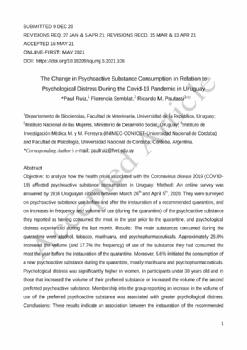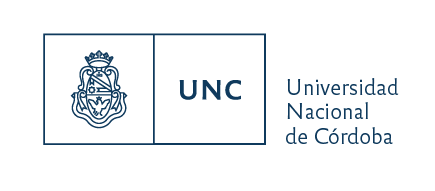| dc.contributor.author | Ruiz, Paul | |
| dc.contributor.author | Semblat, Florencia | |
| dc.contributor.author | Pautassi, Ricardo Marcos | |
| dc.date.accessioned | 2021-08-11T16:20:39Z | |
| dc.date.available | 2021-08-11T16:20:39Z | |
| dc.date.issued | 2021 | |
| dc.identifier.citation | Ruiz, Paul; Semblat, Florencia; Pautassi, Ricardo Marcos; The Change in Psychoactive Substance Consumption in Relation to Psychological Stress During the Covid-19 Pandemic in Uruguay; Sultan Qaboos University; Sultan Qaboos University Medical Journal; 2021; 1; 5-2021; 1-16 | es |
| dc.identifier.issn | 2075-0528 | |
| dc.identifier.uri | http://hdl.handle.net/11086/19410 | |
| dc.identifier.uri | https://journals.squ.edu.om/index.php/squmj/article/view/4358 | |
| dc.description.abstract | Objective: to analyze how the health crisis associated with the Coronavirus disease 2019 (COVID-19) affected psychoactive substance consumption in Uruguay. Method: An online survey was answered by 1916 Uruguayan citizens between March 26th and April 5th, 2020. They were surveyed on psychoactive substance use before and after the instauration of a recommended quarantine, and on increases in frequency and volume of use (during the quarantine) of the psychoactive substance they reported as having consumed the most in the year prior to the quarantine, and psychological distress experienced during the last month. Results: The main substances consumed during the quarantine were alcohol, tobacco, marihuana, and psychopharmaceuticals. Approximately 29.0% increased the volume (and 17.7% the frequency) of use of the substance they had consumed the most the year before the instauration of the quarantine. Moreover, 5.6% initiated the consumption of a new psychoactive substance during the quarantine, mostly marihuana and psychopharmaceuticals. Psychological distress was significantly higher in women, in participants under 30 years old and in those that increased the volume of their preferred substance or increased the volume of the second preferred psychoactive substance. Membership into the group reporting an increase in the volume of use of the preferred psychoactive substance was associated with greater psychological distress. Conclusions: These results indicate an association between the instauration of the recommended quarantine in Uruguay and greater psychoactive substance use during the period, as well as an association between increased psychoactive substance use during this period and levels of psychological stress. These results are relevant in terms of public health and public policies. | es |
| dc.language.iso | eng | es |
| dc.rights | Attribution-NonCommercial-NoDerivatives 4.0 Internacional | * |
| dc.rights.uri | http://creativecommons.org/licenses/by-nc-nd/4.0/ | * |
| dc.subject | Covid 19 | es |
| dc.subject | SARS-CoV-2 | es |
| dc.subject | Uruguay | es |
| dc.subject | Psychoactive substances | es |
| dc.subject | Pandemic | es |
| dc.title | The Change in Psychoactive Substance Consumption in Relation to Psychological Stress During the Covid-19 Pandemic in Uruguay | es |
| dc.type | article | es |
| dc.description.version | publishedVersion | es |
| dc.description.fil | Fil: Ruiz, Paul. Universidad de la República; Uruguay. | es |
| dc.description.fil | Fil: Semblat, Florencia. Instituto Nacional de las Mujeres; Uruguay. | es |
| dc.description.fil | Fil: Pautassi, Ricardo Marcos. Universidad Nacional de Córdoba. Facultad de Psicología; Argentina. | es |
| dc.description.fil | Fil: Pautassi, Ricardo Marcos. Consejo Nacional de Investigaciones Científicas y Técnicas. Instituto de Investigación Médica Mercedes y Martín Ferreyra; Argentina. | es |
| dc.journal.city | Mascate | es |
| dc.journal.country | Omán | es |
| dc.journal.editorial | Sultan Qaboos University | es |
| dc.journal.number | 5 | es |
| dc.journal.pagination | 1-16 | es |
| dc.journal.title | Sultan Qaboos University Medical Journal | es |
| dc.journal.volume | 1 | es |





